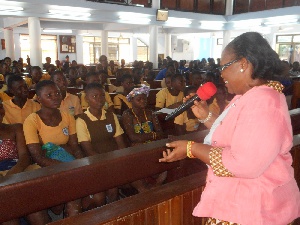Mrs Doris Mensah, the Girls Education Officer of Ashaiman, has called on adolescent girls to be mindful in all their interactions with men and resist the temptation for sexual favours.
She said: “you need to be wary of men because some of them don’t care who you are to them, either fathers, uncles or grandfathers,- be careful when you interact with them.”
Mrs Mensah said this at a sensitisation programme on sexual abuse and management for school children at Ashaiman.
The event was organised by the SOS Children’s Villages Ghana under its: “Quality Education Now” project.
She said there are two types of child sexual abuse, namely, contact abuse and non-contact abuse.
Mrs Mensah said contact abuse include touching related instances where an abuser makes physical contact with a child by touching or fondling of any part of the body whether the child is wearing clothes or not.
Mrs Mensah said the signs and symptoms of sexual abuse were bruises, scars, chafing/roughness, or bite marks in the genital area and discharge or bleeding from the vagina. Others are rectal or genital bleeding, anal tears or dilation.
She said the effects of child sexual abuse include low self-esteem, a feeling of worthlessness, lack of trust in adults and abnormal or distorted view of sex and in some instances, the effects could be so strong that the child may even become suicidal.
Others have sleeping difficulties or nightmares, depression or withdrawal from friends or family, refusal to go to school, and delinquency/conduct problems.
Mrs Mensah said children who have suffered from sexual abuse are also at an increased risk of future abuse and may become child abusers themselves.
She said to prevent sexual abuse, children and parents should learn and apply the personal safety boundary rules by ensuring that no one takes a look at their private parts or touch their private parts.
She said children should avoid watching pictures of private parts of other persons on television, magazines, and computers or on cell phones and they need to be taught how to get out of scary or uncomfortable situations.
“Let children understand that they will never be in trouble if they report perpetrators and let them be aware that a body touch might tickle or feel good but they should learn to say no,” Mr Mensah said.
General News of Saturday, 9 June 2018
Source: ghananewsagency.org













